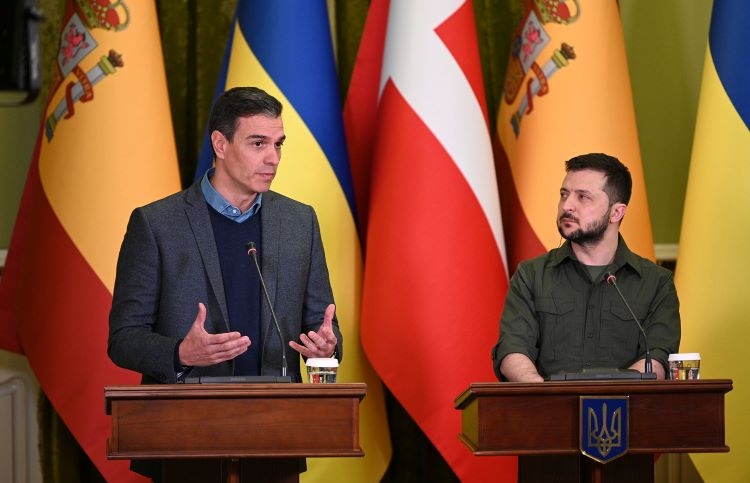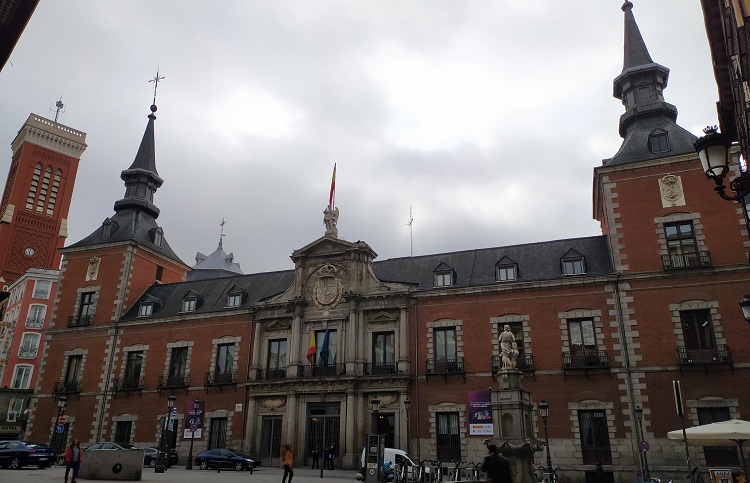The Diplomat
The President of the Government, Pedro Sánchez, was received yesterday in Kiev by the President of Ukraine, Volodymir Zelensky, to whom he conveyed Spain’s “full support” against “this unjust and unjustified war” and to whom he announced the sending of 200 tons of military material, especially ammunition, an amount that represents “more than double what has been sent so far”.
Sánchez arrived yesterday morning in Kiev accompanied by the Prime Minister of Denmark, Mette Frederiksen. After being received in the capital by the Deputy Prime Minister for European Affairs, Olha Stefanishyna, and by the Spanish chef José Andrés -who is in Kiev to supervise the work of his NGO World’s Central Kitchen-, the head of the Executive and his Danish counterpart visited the town of Borodyanka, located about 60 kilometers from Kiev and where they could see, first hand and on the ground, the effects of the Russian bombardments. “Shocked to see on the streets of Borodyanka the horror and atrocities of Putin’s war. We will not leave the Ukrainian people alone,” he declared via Twitter.
Later, Sánchez and Frederiksen held a meeting with President Zelensky, at the end of which they held a joint press conference in which the Prime Minister conveyed to the Ukrainian leader his “deepest condolences for the loss of innocent Ukrainian lives” and the “full support” of Spain “to Ukraine in these difficult times”. He also warned the President of Russia, Vladimir Putin, of the “firm determination to condemn this unjust and unjustified war”. This is the first visit of a Spanish Prime Minister to Ukraine, coinciding with the thirtieth anniversary of the establishment of diplomatic relations.
Pedro Sánchez also announced during the same press conference that Spain has just sent 200 tons of ammunition and other military material to Ukraine, “the largest shipment to date and more than double what has been sent so far”, through the Navy ship Ysabel. The shipment also includes thirty trucks and another ten light vehicles. The head of the Executive also recalled that Spain has already sent eleven airplanes with military and other material and has also contributed 111 million euros in financial aid through the European peace fund, in addition to a humanitarian aid package of 31 million euros, “the largest ever made”. The Prime Minister also confirmed to Zelensky that Spain will reopen its Embassy in Kiev, closed after the beginning of the war.
On the other hand, President Sánchez assured Zelensky that Spain, one of the more than 40 countries that have supported the investigation of war crimes in Ukraine, will make available to the International Criminal Court (ICC) a multidisciplinary team composed of eight experts from the Ministry of Interior and 39 forensic doctors for field work from different Autonomous Communities, as well as forensic personnel and doctors for laboratory work from the Ministry of Justice. The objective is to contribute to the investigation of alleged war crimes, genocide and crimes against humanity in Ukraine. The team will collaborate in the collection and analysis of evidence that will help in the identification of the victims, the explosive material used and the techniques employed, as well as in the identification of the perpetrators of the events under investigation. Spain’s objective, he assured, is “to fight against impunity” because “the atrocities committed” by Russia “cannot remain unpunished”. “We want Putin to face the responsibility for these crimes,” he warned.
Zelensky calls for sanctions on banks and hydrocarbons
For his part, Volodymir Zelensky declared that the visit sends a powerful signal of unity against the Russian invasion and called for the continued imposition of “effective sanctions” against the Russian Federation. In this sense, he demanded that all Russian banks be included in the sanctions and that the necessary steps be taken to prohibit the import of oil and gas from Russia, a measure that has generated division within the EU. He also welcomed the arms shipment announced by Sanchez and warned of the need for them to “arrive as soon as possible”.
Mette Frederiksen acknowledged that what European countries are doing to help Ukraine “is not enough” to stop the war. “We have already done an awful lot and we are going to do more, but we are both very aware that we will have to be prepared to meet their needs for financial, humanitarian, political and military assistance, because this may go on for a long time,” she stated.







